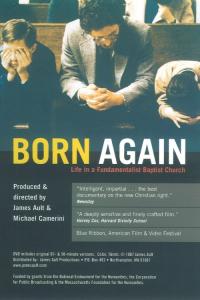Feeling Nostalgia for Fundamentalism
I had a memory “flashback.” I suddenly, out of nowhere, remembered and felt an experience from the somewhat distant past. I was attending the annual national convention of the American Academy of Religion—a professional society of religion scholars that drew around four to five thousand attenders. I don’t remember the city-location that year, but I remember an event very clearly. Every year the AAR put on a film event. Members and paid attenders were invited to sign up to attend the showing of a film about some religious subject. That year, sometime in the late 1980s, as I recall, the advertised film was “Born Again: Life in a Fundamentalist Baptist Church.” I decided to register to attend.
The film is a documentary based on the maker’s three year sojourn with a fundamentalist Baptist church in New England. He also wrote a book about his time among them. I never read the book. I entered the large room in the convention center with some trepidation as I knew many, very many, of the attendees at AAR meetings were anything but fundamentalists. I wondered what the response would be.
You need to know that I grew up in a fundamentalist church and denomination. It was not Baptist; it was Pentecostal. But I know that our ethoses overlapped very much. We sang the same songs in church. We believed in the inerrancy and literal interpretation of the Bible. We were both very strict with regard to lifestyles. But the main similarity to me, as I learned more about Baptist fundamentalism, mostly later in life, was the extremely warm, cozy, family-feeling of our churches. And the warmth and even passion of our worship services, prayer meetings, and Bible studies.
I wandered away from Pentecostalism and fundamentalism when I attended a moderately evangelical Baptist seminary where I was taught that “evangelicals” were not fundamentalists. I embraced “mainstream evangelicalism” and left strict fundamentalism behind. Right out of seminary I served as youth minister in a mainline Presbyterian church. Later I joined the American Baptist Churches, USA. My ultra-conservative family and friends told me I had “gone mainline” which was sort of like some kind of apostasy.
I watched the documentary together with a large audience of mostly women religion scholars. I have no idea about their specific religious affiliations or theologies. However, as the film continued I got teary-eyed! I was feeling it. It took me back to my childhood and youth and young adulthood (through college). Especially the views of worship services in the fundamentalist Baptist church reminded me of my own home church, even though it was much more emotional than that.
But then, to my shock and dismay, many of the other watchers of the film began to groan and moan and hiss and sigh, very loudly. Some got up and left the room in a huff. Rarely have I felt so alone in a crowd. Tears were trickling down my checks even as some around me were muttering “no” and “oh, my” and “terrible.”
What was I experiencing? Perhaps what brought this experience to mind (and even to feelings) was watching a Youtube video by an ex-Mormon who waxed eloquent about what he missed of his LDS upbringing in spite of having left the church far behind. I could see that he was getting emotional even as he talked somewhat disparagingly about the aspects of Mormonism he came to reject. Clearly, he missed the warmth of feeling, the coziness of belonging, the clarity of belief, the lack of worldly ambiguity, the certainty, the sense of having all truth around and within him. He’s now agnostic. I’m not that, but I am skeptical of all things dogmatic and (to me) fanatical in religion.
But I freely admit that I could not understand my fellow film-watchers’ strong negative reactions to the film. The people in the film were sincere, salt-of-the-earth, well-intentioned, simple folks who went out of their way to help each other and care about each other. The church was their extended family. Yes, there were problems within the church and I did not agree with everything the pastor or others said or did. But watching the film nevertheless “picked me up and transported me” back in time to a time in my life when everything about life was simple, clear, uncomplicated, warm, meaningful, even exciting. God was real to us.
Could I ever go back into that religious context? No. Actually, I was expelled from it for asking the wrong questions and in the wrong ways. The motto was “Doubt your doubts and believe your beliefs!” Whenever I asked a question that could possibly be interpreted as doubting something the church or the denomination believed and taught, I was shamed, just for asking it.
*If you choose to comment, make sure your comment is relatively brief (no more than 100 words), on topic, addressed to me, civil and respectful (not hostile or argumentative), and devoid of pictures or links.*














